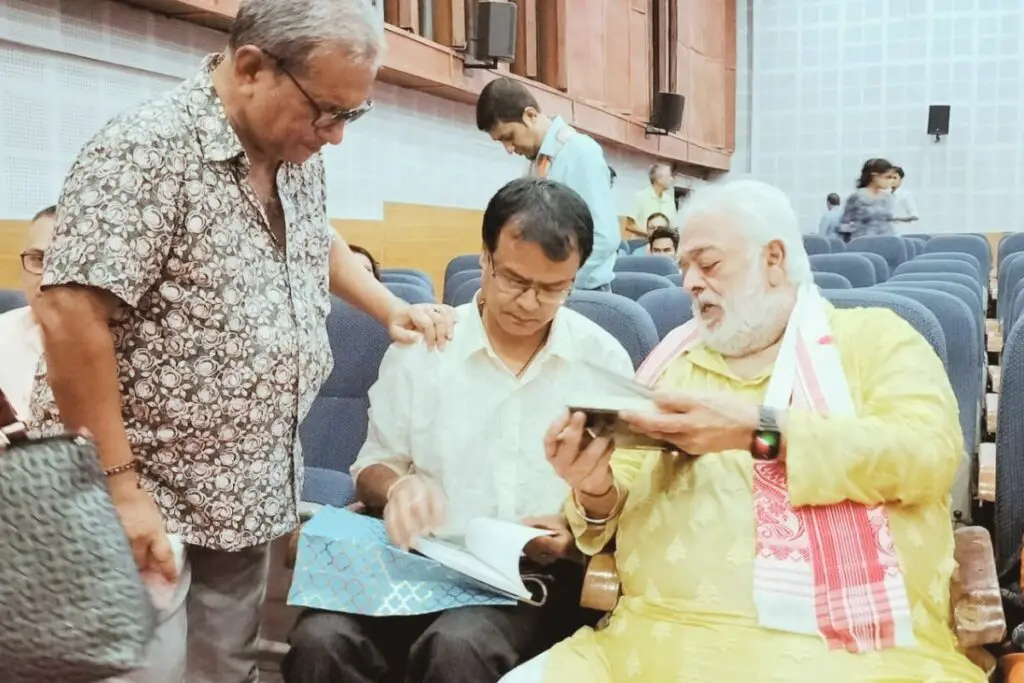Film festivals are considered as a significant platform for the preservation and exhibition of heritage and the Chalachitram National Film Festival (CNFF) is one such platform whose motto and central theme reflect a similar ethos.
The two-day festival, which concluded recently in the city, showcased a variety of films and documentaries by emerging as well as established filmmakers.
The 7th edition of CNFF commenced with the ceremonial lighting of the sacred lamp by Piyush Roy, Professor and Founding Dean, School of Film, Media and Creative Arts at R.V University, Bengaluru. Apart from showcasing their works, filmmakers have found inspiration from diverse cinematic expressions.
Director Utpal Datta has expressed elation at witnessing the festival’s profound influence in inspiring a whole range of new generation filmmakers to delve into their rich cultural history and artfully weave both fictional and factual narratives around it. For, “the soul of a civilization is its heritage,” emphasized Christopher Dalton, the artistic director.
Veteran filmmaker and Advisory Board member, Rahul Rawail shared invaluable insights from his early days spent in R.K. Studios, where he learnt the ropes of filmmaking from the legendary Raj Kapoor to his own independent works, offering guidance and techniques to budding filmmakers.
Following this enlightening session, he unveiled Prantik Deka’s book ‘Past Revisited’, a literary exploration of the cinema of Assamese. Prior to the screening of films, the curtains rose to a dance video interpretation of Vande Mataram, which was choreographed, and edited by the well-known Satriya dancer Prerona Bhuyan.
The opening film of the two-day event was the National Award-winning filmmaker cum cinematographer Rajendra Janglay’s documentary ‘Durga Chitra Shala’, which is based on the life and works of the Padma Shri awardee Durgabai Vyam, renowned for her pioneering works in the Pardhan-Gond tradition of tribal art of Madhya Pradesh.

An insightful interactive session also took place among the students of Bhupen Hazarika Film and TV Institute, film enthusiasts and Dr Piyush Roy, exploring future-oriented topics and emerging technologies such as AI, and the pros and cons of filmmaking in the Digital Age, among other things. The session was moderated by Indrani Laskar and Ratan Sil Sarma.
The non-competition panorama included the premiere screening of ‘Prabahini’, directed by the vice-president of the Chalachitram Society, Prabal Khaund.
A 3-member Chalachitram Grand Jury conferred the Best Film award upon Dhrubajit Baishya’s ‘Kameez’, which jury member Piyush Roy described as “a celebration of solitude that creates empathy in space and time lapse.”
Biswajit Das won the Best Director award for ‘March’, while Gunjan Kashyap’s exceptional screenplay in ‘Home Brews: Struggles for a Tradition’ was honoured with the Best Screenplay award. Rajveer Pardeshi’s performance in ‘Chirbhog’ was recognised with a Jury Special Mention for Best Child Actor. The award for Best Cinematography was received by Sumedha Bhattacharyya for her mesmerizing visuals in ‘Mau : The Spirit Dreams of Cheraw’, lauded by jury member Shiladitya Bora for its surreal imagery.
The award for Best Film from NE India was conferred upon Pranab Sarmah’s ‘Mukha : The Mask’. The film, says jury member Meghachandra Kongbam, “highlights the rich tradition of Mukha art in Assam, which was introduced by the 15th century saint and cultural icon Srimanta Sankardev in the performance of Bhaona, a form of dance drama depicting popular stories from Hindu Mythology and gives its uniqueness in the world of the Mask arts with captivating visuals. The film covers the craftsmanship of the artisans making the masks and individual efforts on the popularization of the art, even to attract the foreign tourists. This film will motivate the audience to ensure the flourishing of the rare beautiful art forms of the country.”
In addition to the Grand Jury Awards, House of Illusions – an indie film studio, founded and conceived primarily to discover obscure talent and to encourage the creation of good cinema, set up an independent jury comprising of sound designer Debajit Changmai and RV University professors Meera Baindur and Deepa Ganesh. Hira Das’ ‘Kaankhowa’, a text on ethics that lays bare the evils of collective oppression, won the House of Illusions Award for Best Short Fiction Film by a Woman Director.
Bobbeeta Sharma’s 40-minute long autobiographical documentary ‘Jnanada: Reflections of Light and Shade’, which traces the cinematic journey of one of the most versatile, graceful and charismatic actresses of Assamese cinema, Jnanada Kakati, won the House of Illusions Award for Best Documentary by a Woman Director.
ALL AWARDS
♣ Best Film — Kameez
Director-Producer: Dhrubajit Baishya
♣ Best Film from NE India — Mukha: The Mask
Director-producer: Pranab Sarmah
♣ Best Director — Biswajit Das (March)
♣ Best Screenplay — Gunjan Kashyap
(Home Brews: Struggles for a Tradition)
♣ Best Cinematography — Sumedha Bhattacharyya
(Mau: The Spirit Dreams of Cheraw)
♣ Jury Special Mention for Best Child Actor
Rajveer Pardeshi (Chirbhog)
♣ House of Illusions Award for Best Short Fiction Film by a Woman Director
Kaankhowa — Director: Hira Das
Producers: Naren Das, Puspalata Roy, & Rachit Passi
♣ House of Illusions Award for Best Documentary by a Woman Director
Jnanada : Reflections of Light and Shade
Director-producer: Bobbeeta Sharma

